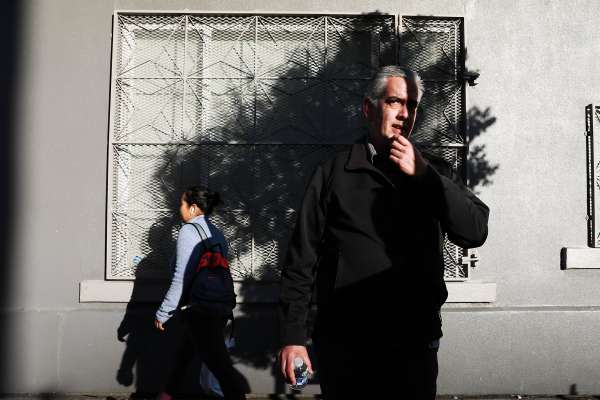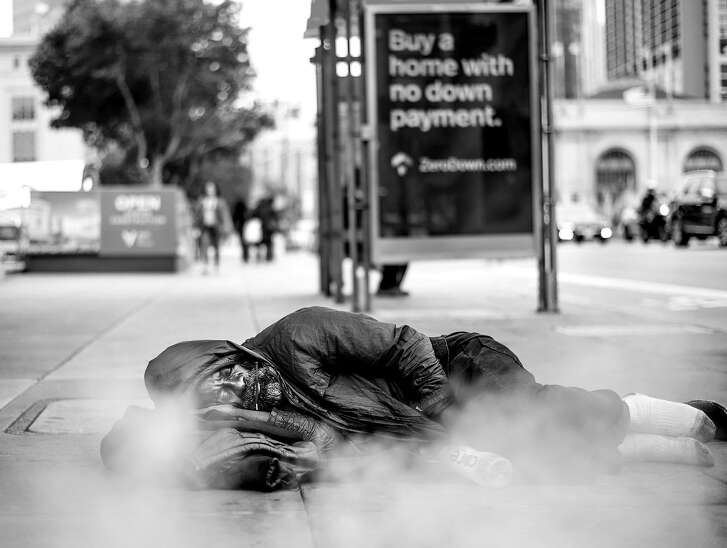It’s ‘life or death’: Recovering addict wants to reinvent SF response to drug crisis


Thomas Wolf knows the sidewalks of the Tenderloin well. They’re his pathway to work. But not long ago, they were his home, his bed, his toilet and his drug den all rolled into one.
Wolf has become outspoken about his descent into the despair that confronts us all as we walk around the streets of San Francisco. He pulled himself out of it and has ideas — sometimes controversial, but always common-sense — for helping others do the same.
Thankfully, he learned this week he’ll get the chance to share his views in an official capacity. The Board of Supervisors named him to the city’s new Street-Level Drug Dealing Task Force, a group of former drug users, former drug dealers, harm reduction specialists and others who will begin meeting regularly in January to help paralyzed San Francisco develop new ways to address its devastating drug crisis.
“Unfortunately, I remember everything. I don’t know why. Sometimes I wish I didn’t, but I do,” Wolf, 49, said of those five months in 2018 spent getting high on heroin, crack and fentanyl, hiding drugs for dealers in exchange for part of the stash and sleeping on cardboard. “Talking about it actually helps me.”
The most salient point he wants to drive home at City Hall is that San Francisco’s so-called compassion toward drug users isn’t compassionate at all. He thinks the city is too wedded to harm reduction — making it safer to use drugs — rather than encouraging people to stop using. He said he was offered free, clean drug paraphernalia by outreach workers, but doesn’t remember ever being offered a treatment bed or even being asked whether he wanted help quitting. Not once.
“With harm reduction, the whole point is to use less while respecting your civil liberties,” he said. “When I was out there homeless and leaving my needles in the street and defecating in the street and urinating in the street, was I protecting your civil liberties?”
He talks in this no-nonsense, straightforward style a lot — on social media, in the media and to the 44 clients he helps as a case manager and life skills coach at the Salvation Army’s Railton Place, a supportive housing facility for formerly homeless people on Turk Street. He said he felt ashamed of his bad choices at first, but now he finds being open helpful in his own salvation and, hopefully, the city’s.
Wolf, a native of San Francisco, was living a rather typical, happy life until 2015. He and his wife of 20 years own a home in Daly City and have two kids, a 13-year-old girl and a 10-year-old boy. He worked as a child support officer for the city of San Francisco. But foot surgery changed everything.
Related Stories
He became addicted to the oxycodone prescribed by his doctors to numb the pain. He was a self-described “functional addict,” able to keep his job and keep playing dad for a while. But he was secretly buying pills in the Tenderloin for $30 apiece after his doctors stopped prescribing them. He spent more than $100,000 on pills, he said, and eventually quit his job.
In April, 2017, he made a fateful decision: walking from Golden Gate Avenue and Leavenworth Street, where dealers sell pills at “Pill Hill,” over to Golden Gate and Hyde Street, where they sell a far cheaper option: heroin. That cost just $10 per high. His addiction grew even worse, and he was high in front of his children and admits to being a terror to his family.
“We lie, cheat and steal — we’re sick like that,” he said of people addicted to drugs.
He disappeared from home for 10 days on a “bender” in early 2018 — and that’s when his wife finally kicked him out.
“My wife gave me an ultimatum — rehab or I had to go,” he said. “I made the decision to go. I chose my drugs over my family.”
Police arrested Wolf six times in the spring and early summer of 2018 — three times for holding drugs for dealers and three times for violating a stay-away order from the corner of Golden Gate and Hyde.
It was that sixth arrest, on June 23, 2018, that finally jolted Wolf out of the sad cycle. Having hit rock bottom and lost his wife, kids and career, he called his brother, who offered to bail him out of jail on the condition he enter rehab. He agreed, and the next day his brother drove him to the Salvation Army’s Adult Rehabilitation Center on Valencia Street.
He stayed there for six months and said he hasn’t touched any illicit substance since June 24, 2018, the first day of his last jail stint. He pledged he never will again.
“It’s a life-or-death thing for me and many addicts,” he said of avoiding drug use. “One is too many and 1,000 isn’t enough, and that’s me. If I go back out there again, it’s because I want to die.”
He means “go back out there” in terms of buying drugs. He’s still out there all the time in his new job as a case manager for the Salvation Army, helping homeless people, mostly veterans, rebuild their lives.
We walked from the Salvation Army on Turk Street to his old haunt at Golden Gate and Hyde the other day, Wolf greeting many people on the street like any neighborhood regular. He learned a lot about the drug trade, and he’s eager to relay the information.
“That guy’s a crack dealer,” he said quietly of one man. “That guy’s a heroin dealer.”
He recalled getting drugs for free by hiding dealers’ heroin, crack cocaine and crystal meth and got to know the dealers pretty well. He described them as mostly undocumented young men from Honduras who live in the East Bay and take BART to the Civic Center to deal. Federal authorities accused 32 Honduran nationals in the fall of participating in a complex Bay Area drug trafficking operation.
San Francisco police arrest the dealers, but they’re often released back to the same street corners where they keep dealing. Wolf said the city’s criminal justice system treats users and dealers similarly, and that needs to change. It needs to offer far more treatment for users and real penalties for dealers.
Wolf estimates that 9 out of 10 people he met living on the streets of the Tenderloin and South of Market are addicted to drugs or alcohol. He said many of them get free meals from soup kitchens so they’re able to spend just about all of their general assistance checks on drugs. He said liquor stores in the Tenderloin even offer “happy meals” — $3 crack pipes and other drug paraphernalia kept in brown bags under the counter.
His trenchant style sometimes garners resistance from homeless advocates who say Wolf shouldn’t presume that what worked for him will work for everybody. But he’s not deterred and is convinced San Francisco makes it far too easy to be a homeless person addicted to drugs and far too hard to pull yourself out of it.
But now he’s managed to do just that — and he’s delighted.
His boss, Ravinn Lore, said Wolf’s professional experience as a child support worker and personal experience as a homeless drug addict has made him indispensable.
“Oh my goodness, he’s been wonderful!” she said. “I’m so happy we found him and he found us.”
She praised Wolf’s desire to help the city through its new drug-dealing task force while admitting his blunt style might take some getting used by other members of the group.
“His path has been pure abstinence, and that works for him, and that’s what he’s promoting and supporting,” she said. “He’s going to bat, and that’s a good thing.”
Supervisor Matt Haney, who proposed the new task force, said he’s talked to Wolf several times, and while they differ in their views of harm reduction, he thinks Wolf’s viewpoint will be crucial.
“He was out there on the very same corners we are trying to change, and that expertise is hugely valuable,” he said, adding he hopes the group as a whole comes up with a big-picture plan for the city’s drug crisis. “When was the last time you heard of someone doing something new or different or exciting in regards to trying to change the situation?”
Wolf already has the ears of the right people. He gave a moving speech at the Salvation Army’s annual holiday lunch last month, earning a standing ovation from city bigwigs and police brass.
His personal life is going well too. He’s living with his parents in Bernal Heights and sees his kids almost every day. He and his wife are in marriage counseling and are slowly repairing their relationship.
He spent several days at home over Thanksgiving, eating prime rib with the in-laws he alienated. He will spend Christmas at home too — his first in three years — and blew his last paycheck not on drugs, but extra presents for his kids. His wife has told him he can move home only when she gives him a house key, and he’s hopeful that will happen by Valentine’s Day.
“Things are good — things are really good,” he said. “I’m at peace. That’s where I am.”
San Francisco Chronicle columnist Heather Knight appears Sundays and Tuesdays. Email: hknight@sfchronicle.com Twitter: @hknightsf

 Pathways Drug Rehabilitation Luxury Addiction Treatment & Detox Center
Pathways Drug Rehabilitation Luxury Addiction Treatment & Detox Center




